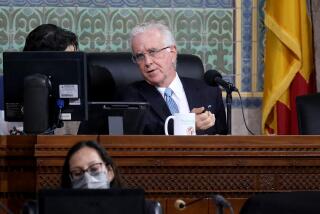Ordered to Listen, Council Members Still Not All Ears
On the Los Angeles City Council’s first day in session after a California appeals court sharply reprimanded members for failing to listen during a public hearing, few of the council members appeared chastened.
Several insisted they must do several things at once -- even if that means they look as though they are not paying attention during meetings -- to do their jobs properly.
“For better or worse, council members, because of the expectations of our jobs, have no choice but to learn how to multi-task,” said Council President Alex Padilla. He said most council members can flip through a report, talk and listen -- all at the same time. “We are strange that way.”
But Padilla also said anyone who comes before the council deserves its attention, and that he believes “they always get it.”
After watching a videotape of a June 13, 2003, council hearing, a three-judge panel of the state’s 2nd District Court of Appeal was not convinced. Council members -- many sporting tropical-themed shirts because it was Hawaiian Shirt Day -- chatted with each other, walked around, read reports and, in one case, talked on a cellphone.
In a sharply worded decision, the court ruled last week that the behavior of council members violated the right of an East Los Angeles strip club to have its appeal on a zoning issue heard. The judges wrote that “the council cannot be said to have made a reasoned decision based upon hearing all the evidence and argument.”
The court ordered a new hearing for the Blue Zebra, which had been seeking to keep its doors open until 4 a.m. over the objections of neighbors. The council unanimously rejected the Blue Zebra’s request at the hearing. But the club’s attorney, Roger Jon Diamond, made a videotape that showed the inattentiveness of council members and appealed the decision to the courts.
The unusual ruling, which drew attention across the nation, thrilled some community members who have long complained that the City Council treats the public rudely.
“We feel we are talking to statues, and often the statues turn their backs on us,” said Michael Bell, an animal rights activist who has addressed the council over the years. Bell added that, in his opinion, it’s unfortunate there are no pigeons in council chambers to do what pigeons usually do to statues.
Just two members of the public addressed the council Tuesday.
Rosalyn Patamakanthin, a Thai attorney, told the council how the city could help in the aftermath of the tsunami in South Asia that killed more than 150,000. The other was a man who spoke to council members about concerns that people were stealing his “intellectual property.”
Neither speaker was making an official appeal, meaning the council was not legally required to listen. The court’s decision applies only when the council is acting in a quasi-judicial capacity, such as when it is hearing appeals on a land-use matter. When council members are passing laws, handing out proclamations or hearing from the general public, they can be as inattentive as they like.
Still, several council members appeared to pay close attention Tuesday. At one point, Eric Garcetti, Wendy Greuel, Martin Ludlow, Antonio Villaraigosa and Tom LaBonge all had their eyes trained on Patamakanthin, with expressions of intense sorrow on their faces.
But others, including Bernard C. Parks, Dennis Zine and Ed Reyes, chatted with aides or city staff members.
Later, Parks raised a philosophical question: “How do they know when you are listening?” It is possible to focus on more than one thing at a time, he said, explaining that it would be difficult “to survive” on the City Council without being able to talk with colleagues and staff members.
Many council members also noted that by the time a matter comes before the full council, it has been heard in a committee and staff members have prepared a report on it. Council members who do their homework, therefore, may already be familiar with the issue and not need to listen to every word of the debate in chambers.
“The court is wrong that council members weren’t listening to somebody in connection with this hearing,” said Councilman Jack Weiss, who appears on Diamond’s videotape engaged in a lengthy cellphone conversation. “We were listening. We were listening to countless Los Angeles residents who are concerned about the operations of strip clubs in our neighborhoods. No amount of bellyaching by the porn industry’s attorney is going to change that.”
Still, some members said, the council could afford to listen a little more.
Council chambers, said Councilwoman Janice Hahn, can be “a very distracting environment.” City staff, other council members, reporters and constituents, she noted, are jockeying to talk to council members.
But Hahn acknowledged that the council could improve its reputation if it listened more when the public spoke.
“I think the council probably could do a much better job of paying attention,” she said, noting that when she attended hearings around Los Angeles a few years ago during the rewriting of the City Charter, many residents complained about the rudeness of the council.
“Frankly, sometimes, we don’t pay attention to each other,” Hahn said. “I know I’ve gotten up to speak passionately about something I care about, and looked across the room and found that no one was listening.”
More to Read
Sign up for Essential California
The most important California stories and recommendations in your inbox every morning.
You may occasionally receive promotional content from the Los Angeles Times.










